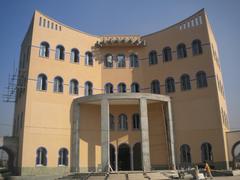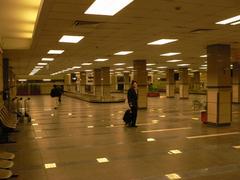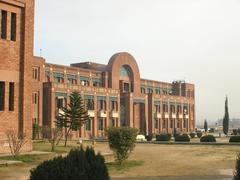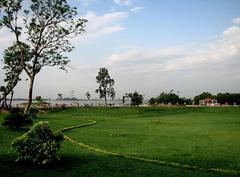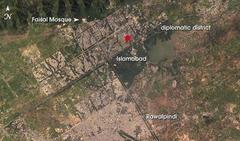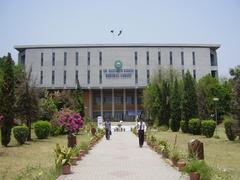France Colony Islamabad Visiting Guide: Tickets, Hours, and Attractions
Date: 15/06/2025
Introduction: History and Cultural Significance
France Colony, located in Islamabad’s prestigious Sector F-7, stands as a testament to the resilience and cultural richness of Pakistan’s marginalized communities. Emerging during the city’s rapid expansion in the late 1970s and early 1980s, this informal settlement—locally known as a “katchi abadi”—became a haven for low-income migrant laborers, predominantly from the Christian minority. Its name is derived from its proximity to the French Embassy, which became an informal landmark for the area (Dawn; Al Jazeera).
France Colony is not a conventional tourist destination. Instead, it offers sociologists, anthropologists, and culturally curious travelers an opportunity to explore the lived realities of urban migration, community cohesion, and the preservation of rural traditions in a challenging urban context. The settlement is characterized by strong social networks, religious festivities, vernacular architecture, and ongoing struggles with infrastructure and legal status (Academia.edu; The Express Tribune).
This guide provides a comprehensive overview of France Colony’s history, demographic makeup, cultural practices, and practical insights for visitors, with an emphasis on ethical engagement and respect for local dignity.
Contents
- Historical Background
- Demographic Composition
- Cultural Heritage and Community Life
- Built Environment and Vernacular Sustainability
- Religious and Festive Practices
- Visiting France Colony: Hours, Access, and Tips
- Ethical Considerations
- Frequently Asked Questions (FAQ)
- Summary and Visitor Recommendations
- References
Historical Background
Origins and Development
France Colony arose in the late 20th century as Islamabad grew and attracted a wave of laborers from across Pakistan, especially Punjab. Many migrants, unable to afford formal housing, settled near the French Embassy, giving the area its name (Dawn). Over time, the colony became a hub for low-income workers serving affluent neighborhoods and diplomatic missions.
Urban Challenges and Legal Status
Despite its decades-long presence, France Colony faces persistent threats of eviction due to zoning enforcement and lacks formal property rights. This has led to chronic overcrowding, limited infrastructure, and exposure to health risks, while advocacy by civil society has helped the community resist displacement and gain partial improvements in amenities (The Express Tribune).
Demographic Composition
Population and Diversity
France Colony is home to an estimated 8,000 to 12,000 residents, living in densely packed dwellings. The majority are Christians from Punjab, though the community also includes Muslim families and migrants from various regions, reflecting Islamabad’s diverse labor force (Al Jazeera).
Socioeconomic Profile
Most residents work in low-wage sectors such as domestic help, sanitation, and construction. Women often serve as domestic workers, while men are employed as sanitation staff or laborers. Child labor is common, and educational opportunities are limited but supplemented by NGO and church-run schools (Human Rights Watch).
Health and Living Conditions
Infrastructure limitations include unreliable electricity, contaminated water supplies, and poor sanitation—factors that contribute to health challenges like waterborne diseases. Residents access healthcare through local clinics, charity organizations, and Islamabad’s public hospitals (The Express Tribune).
Social Networks and Gender Dynamics
France Colony’s resilience is underpinned by strong communal bonds, mutual aid, and extended family structures. Women play significant roles in both households and community organizations, contributing to social solidarity and economic survival.
Cultural Heritage and Community Life
France Colony preserves many rural traditions, visible in language, attire, folk music, and communal rituals. Religious festivals such as Christmas, Easter, and Eid are celebrated with processions, feasts, and music, reinforcing community identity (Academia.edu). Mutual support networks, faith-based groups, and NGOs provide essential services and help maintain cultural continuity.
Built Environment and Vernacular Sustainability
The settlement’s architecture blends necessity and tradition, with homes built from locally available materials using vernacular techniques. Narrow lanes, shared courtyards, and informal public spaces foster social interaction. Sustainability practices such as water conservation and small-scale urban agriculture are common, reflecting rural heritage (Academia.edu).
Religious and Festive Practices
Religion anchors community life, with churches and mosques serving as centers for worship and social gatherings. Festivals bring the community together, featuring traditional music, communal meals, and intergenerational rituals.
Visiting France Colony: Hours, Access, and Tips
Visiting Hours and Entry
- Hours: No official visiting hours; daytime visits (9:00 AM–5:00 PM) are safest and most respectful.
- Entry: No tickets or entry fees. Always seek permission from local leaders or NGOs before visiting.
How to Get There
France Colony is accessible by taxi, ride-sharing, or public transport from central Islamabad. Coordination with local NGOs or community organizations is recommended for a respectful and informative experience.
Guided Tours
Some NGOs and community groups offer guided tours, providing valuable context and facilitating safe engagement. Advance booking is advised.
Accessibility
The area’s narrow, uneven pathways may pose challenges for those with mobility issues. Comfortable footwear is recommended.
Health and Safety
- Avoid drinking tap water; carry bottled water and hand sanitizer.
- Be aware of infrastructural limitations.
- Visit with a local guide or NGO for safety and insight.
- Respect local customs and dress modestly.
Ethical Guidelines
- Always seek consent before photography or interviews.
- Avoid offering money for photos or access; donate through reputable organizations.
- Support the local economy by purchasing from residents or contributing to NGOs.
- Practice responsible tourism and minimize environmental impact.
Frequently Asked Questions (FAQ)
Q: Is France Colony safe for visitors?
A: Daytime visits with local guidance are generally safe. Exercise standard urban precautions.
Q: Are there entry fees or tickets?
A: No. France Colony is a residential area; no fees or permits are required.
Q: Can I take photographs?
A: Only with explicit permission from residents; respect privacy and dignity.
Q: Are guided tours available?
A: Yes, often through NGOs or community liaisons.
Q: How can I support the community?
A: Donate via credible organizations or support local vendors.
Summary and Visitor Recommendations
France Colony, Islamabad, reveals the rich tapestry of urban resilience, cultural tradition, and the challenges faced by marginalized communities. Visitors seeking insight into Islamabad beyond its planned sectors will find a vibrant community shaped by migration, faith, and mutual support (Dawn; Academia.edu). Engagement should be guided by ethical awareness—visit during daylight, coordinate through local NGOs, and act with sensitivity to local norms. Combined with visits to nearby landmarks like Faisal Mosque and the Pakistan Monument, a trip to France Colony deepens one’s understanding of Islamabad’s diverse social landscape (The Express Tribune; Human Rights Watch).
References
For further travel tips, updates, and responsible tourism resources, consider downloading the Audiala app and exploring more articles on Islamabad’s neighborhoods.
